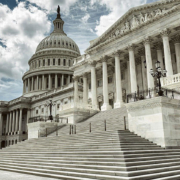Government Law Departments 2018; Thomson Reuters Survey.
Pressure for lawyers still mounting as tighter budgets, rising workloads, and fear of attrition continue to ratchet up concern
Government attorneys continue to work in a “challenge-rich” environment. As their workloads continue to grow, both in volume and complexity, these lawyers find themselves dealing with increased pressure to stay current on the latest legal trends, key case developments, and changing regulations. Moreover, baby boomer-era attorneys are contemplating retirement within the next few years, taking with them a generation of institutional knowledge. On top of all this is the reality that government law departments have limited resources and continue to be tasked to do more with less.
GROWING WORKLOADS AMID FEWER RESOURCES
A recent Thomson Reuters survey of 218 government attorneys illustrated in the starkest terms the status quo for government attorneys on all levels. According to the survey, 72 percent of government attorneys expect their workload to increase in the next few years.
Further, 72 percent say scarce resources and tighter budgets add pressure to their workload. Indeed, fear of budget cuts was identified as the top future challenge among government lawyers, with 32 percent of lawyers citing it as a top concern, compared with 20 percent in the 2017 survey.
Sara Galligan, director at the Ramsey County Law Library, agrees with that assessment. (Ramsey County encompasses part of the greater Minneapolis-St. Paul area, and includes St. Paul as its county seat.) “We have had some budget pressure in the past,” Galligan said. “Our operation, in some respects, is dependent on a larger institution, and if we were to bring up a new infrastructure on our own, we would be challenged on both staff and funding levels.”
INCREASINGLY DIVERSE AND COMPLEX ISSUES
The work of government attorneys differs in several key ways from that of private-practice attorneys, either at law firms or within corporate legal departments; and these differences mean that government lawyers face challenges that also differ from their private-practice counterparts.
For example, private-practice attorneys tend to be specialists, but government lawyers cannot afford to concentrate solely on one practice area or type of case. Because of the generalist nature of their work, government lawyers are usually “jacks of all trades,” working across a wide variety of legal disciplines on myriad types of legal matters, from contracting to civil suits involving citizens to land use and tax disputes. Another key difference between private-practice attorneys and government attorneys: A government lawyer’s work is done in the public eye, and media scrutiny and public criticism too often come as part of the job. “It’s soup to nuts,” one former county attorney from Florida said last year. “I might be in county court one morning arguing a zoning code enforcement, and a couple hours later be working on a federal housing grant or drafting a contract to purchase a sheriff’s helicopter.”
In fact, according to this year’s survey, government attorneys report they are working on an average of 33 unique legal issues per week, roughly the same number as last year’s survey. And they spend approximately six hours per week getting up to speed on unfamiliar legal topics.
The survey also found that 62 percent of attorneys said they have been working on a wider variety of issues during the past two years, while 60 percent said they anticipate this trend to continue to at least 2020. And unlike their law firm counterparts, government attorneys do not have the relative luxury of being able to turn down legal work if it’s outside their expertise, or like their colleagues in corporate legal departments, reach out to outside counsel for help on certain matters or for expert legal advice. Because of the variety and complexity of government legal work, a full one-third of government lawyers surveyed said they are not confident they have uncovered all relevant material information by their deadline in the legal matters they are tasked to do.
LOSS OF INSTITUTIONAL KNOWLEDGE
Underscoring these challenges is the expected wave of retirements many experts predict over the next few years as many baby boomer-era professionals begin retiring en masse. “The historic and long experience of the baby boomer generation also affirms loyalty to certain principles related to the organization and access to information – both legal and non-legal,” said Ramsey County’s Galligan. “And although our staff is small, we could lose not just institutional knowledge but also a historic perspective on legal information and the necessity to organize and access information in multiple formats.”
The survey showed that 74 percent of government lawyers reported they have reached out to a colleague for help at least once a week on an unfamiliar legal issue. Without those knowledgeable, older colleagues in the office anymore, seeking expert assistance may be more difficult. Little wonder that in the survey 38 percent of lawyers said the loss of institutional knowledge in their department was a concern, while 30 percent said their department is struggling to retain their top talent. Both of those percentages were higher than in last year’s survey.
WHAT GOVERNMENT LAWYERS AND THEIR DEPARTMENTS CAN DO
If you take all these challenges in hand – workloads growing in size and complexity, the mounting pressure to keep up with new legal developments, the potential attrition of your legal team due to retirements – all have a single common denominator: government lawyers’ loss of control over their work time.
What can government agencies do to aid their attorneys in this battle against the clock?
Here are three recommendations your department can implement today:
1. Make sure your legal research plan is as comprehensive as possible, so you are not blocked from valuable content you might need only once or twice a year.
2. Invest in additional resources to give you the best starting point on an unfamiliar area of law. Expertly drafted content that is accurate and maintained should be your go-to resource versus online search engines or other risky search tools.
3. Find solutions to automate more routine tasks. For instance, according to the survey, 46 percent of the average government attorney’s time is spent drafting, reviewing, and proofing legal documents. Drafting solutions can streamline your process and help your legal department produce more accurate work product.
EMBRACE THE FUTURE OF LEGAL
Now, with more efficient research methods available to give less-experienced attorneys access to expert insight, many of these challenges can be properly addressed. And fortunately, these attorneys seem eager to harness the capabilities of such advanced technologies, especially those that use cutting-edge tech like artificial intelligence (AI) or machine learning. In the survey, government attorneys showed they were very eager to adopt this new wave of technologies, with almost 48 percent of attorneys surveyed saying they believe AI is useful for task automation, and 25 percent saying they believe AI’s main benefit is to augment, scale, and help an attorney focus on more interesting legal tasks.
In the long run, technologies like AI will revolutionize the way all legal work is done, and smart government attorneys already know that. They envision a day when they can more efficiently allocate their time and workflows through their departments, reduce the amount of time they spend on routine tasks, and get up to speed much more quickly on even unfamiliar areas of law.
This, they know, will allow them to focus on why they became government attorneys in the first place – to serve their community and its citizens.
Find out how you can increase efficiency and save time like never before at legalsolutions.thomsonreuters.com/govlawdept


